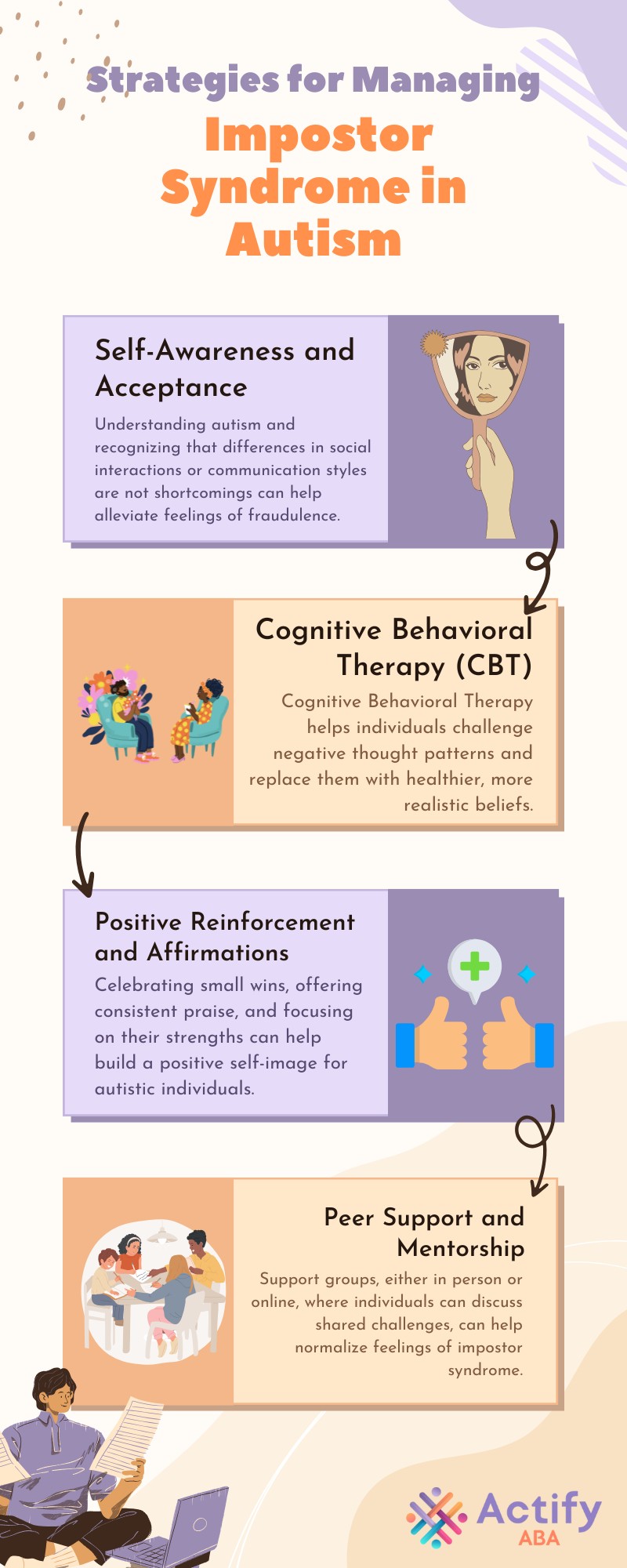
Key Points:
- Impostor syndrome is often experienced by individuals with autism due to struggles with social interactions and self-acceptance.
- Those with autism may doubt their abilities, feeling they don’t meet expectations despite their successes.
- Recognizing impostor syndrome in autistic individuals can be key to helping them develop self-confidence and coping strategies.
Living with autism often involves unique challenges, especially when it comes to navigating social norms and expectations. One of the hidden struggles that many individuals with autism face is impostor syndrome. According to studies, up to 94% of autistic individuals develop various mental health conditions, including impostor syndrome.
This phenomenon, where someone feels like a fraud despite clear evidence of their capabilities, stems from their difficulties in social communication, self-perception, and comparison to others, especially when they don’t conform to societal norms.
This article explores the complex relationship between impostor syndrome and autism and how it can impact mental health, self-esteem, and overall well-being.
What is Impostor Syndrome and How Does It Relate to Autism?
Impostor syndrome is a psychological condition where a person consistently questions their successes and fears being seen as a fraud. Even with clear proof of their abilities and accomplishments, they may feel undeserving or believe they don’t truly belong.
For individuals with autism, this syndrome can be particularly pervasive. Autism often involves differences in social communication, repetitive behaviors, and sometimes, a heightened sensitivity to external stimuli. These characteristics can make it difficult to fully engage in social environments or interpret social cues, which leads to feelings of inadequacy.
Children and adults with autism may feel out of place in social settings or that their successes are somehow less valid than others’ achievements. This misalignment can trigger feelings of impostor syndrome, especially when they struggle to meet conventional expectations in areas like work or school.
The constant comparison to peers, who may seem to easily meet social norms, can lead to feelings of fraudulence or inadequacy.
Why Do Autistic Individuals Experience Impostor Syndrome?
The reasons autistic individuals may experience impostor syndrome are multifaceted, involving both social and psychological factors. The constant comparison to peers, who may seem to easily meet social norms, can lead to feelings of fraudulence or inadequacy. Below are some common reasons why autistic individuals may experience impostor syndrome:
1. Difficulty with Social Interactions
Social communication challenges are a core feature of autism, and these challenges can lead to misunderstandings, isolation, or a sense of being disconnected.
People with autism often have trouble reading social cues, understanding humor, or responding in expected ways. When their social behaviors are misinterpreted, they might feel like they don’t fit in, contributing to the feeling of being an impostor.
2. Comparing Themselves to Neurotypicals
One significant aspect of impostor syndrome in autism is the constant comparison to others. Autistic individuals may feel that they don’t measure up to the social or professional expectations set by their neurotypical peers.
They may feel like they are pretending to meet these standards without being able to truly connect with others. This creates an inner tension where their success feels unearned or even fraudulent.
3. Self-Doubt and High Expectations
High standards, either imposed by themselves or others, often exacerbate feelings of inadequacy. Many autistic individuals may struggle with perfectionism or feel an intense pressure to meet goals that seem out of reach.
If they fail to meet these expectations, they may start questioning their abilities, reinforcing impostor syndrome.
4. Masking and Camouflaging
Many individuals with autism engage in masking, where they hide or suppress their autistic traits to blend in with others.
While this coping strategy can help in social situations, it is mentally exhausting and often leads to feelings of being disconnected from their authentic self. This ongoing act of pretending can reinforce feelings of fraudulence, particularly when an individual is not able to be genuine—an experience that can significantly contribute to emotional exhaustion. To learn more about recognizing these signs and finding relief, explore Autistic Fatigue and Burnout: Symptoms and Coping Strategies.
How Does Impostor Syndrome Affect Autistic Individuals?
Impostor syndrome can manifest in different ways for individuals with autism, affecting their mental health, social life, and academic or professional performance. The impact can be significant if not addressed properly.
The most common side effects of having impostor syndrome include:
1. Mental Health Struggles
Those with autism and impostor syndrome may experience increased anxiety, depression, and stress. The fear of being “found out” can create a constant state of alertness or worry, making it difficult for the individual to relax.
These feelings of inadequacy can prevent them from reaching out for help or taking on new challenges, fearing they will fail or disappoint others.
2. Decreased Self-Esteem and Confidence
The ongoing self-doubt that comes with impostor syndrome can erode self-esteem. Autistic individuals who internalize these feelings may begin to believe that they aren’t deserving of success or recognition, even if they have achieved remarkable things.
This lowers confidence and can make it harder to engage with opportunities, whether social or professional.
3. Social Withdrawal
If social interactions are perceived as challenging and one feels like an impostor in those settings, withdrawal from social situations may occur.
The fear of being judged or misunderstood can discourage autistic individuals from participating in group activities or professional interactions, leading to isolation.
4. Overcompensation and Burnout
To counter feelings of inadequacy, some individuals may overcompensate by overworking, pushing themselves to perfection, or engaging in excessive behaviors to mask their traits.
This can lead to burnout, as they are unable to sustain the energy required to keep up with the pressures they place on themselves.
Strategies for Managing Impostor Syndrome in Autism
While impostor syndrome is common in autistic individuals, there are effective ways to manage and reduce its impact. Here are several strategies that may help individuals develop healthier perceptions of themselves.

When to Seek Professional Support for Impostor Syndrome and Autism
If impostor syndrome becomes particularly disruptive or leads to significant mental health struggles, seeking professional help is a crucial step. Behavioral therapies, such as Applied Behavior Analysis (ABA), can offer strategies for managing emotional and psychological challenges, including impostor syndrome.
Seeking support early can prevent long-term impacts on self-esteem, relationships, and academic or career growth. Mental health professionals, especially those experienced with neurodivergent individuals, can help identify underlying causes of impostor feelings and tailor interventions accordingly.
Whether through individual therapy, group support, or educational accommodations, the goal is to build confidence, self-awareness, and emotional resilience.
Help Your Child Thrive With ABA Therapy in Maryland
Actify offers ABA therapy in Maryland, providing tailored support for individuals with autism and their families. Our experienced therapists work with clients to address both the underlying behaviors of autism and the emotional challenges that often accompany it, such as impostor syndrome.
If you’re looking for ABA therapy in Maryland, Actify is here to help. Let us guide you through the journey of improving your child’s self-awareness and reducing the impact of impostor syndrome.
Contact us today to start the process of building a brighter future for your family!
